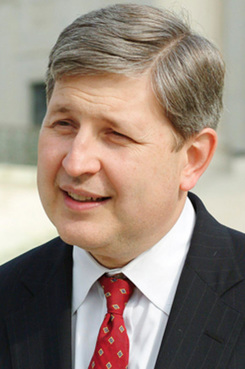Transgender Troops Probe Conservative Groups' Contacts With Trump Administration
"The executive action at issue took place under circumstances that strongly suggest that the explanation given by the executive for its action is untrue," lawyers for the plaintiffs wrote in seeking to compel Heritage Foundation and Family Research Council to respond to a subpoena.
April 09, 2018 at 02:58 PM
5 minute read
 President Donald Trump and Vice President Mike Pence. Credit: White House
President Donald Trump and Vice President Mike Pence. Credit: White House
Challengers to the Trump administration's ban on transgender military service have asked a federal district judge to compel the Family Research Council and the Heritage Foundation to produce records about any communications with the administration that relate to the new policy.
“The purpose of the executive in adopting the transgender ban is squarely at issue in this case, and communications between the executive and advocacy groups like FRC and Heritage about that ban are likely to illuminate its purpose,” wrote Paul R.Q. Wolfson of Wilmer Cutler Pickering Hale and Dorr, counsel to the challengers in the case Doe v. Trump.
Wolfson continued: “That is especially true in a case like this one, where the need to discover the communications arises precisely because the executive action at issue took place under circumstances that strongly suggest that the explanation given by the executive for its action is untrue.”
In the motion, Wolfson, along with lawyers from Foley Hoag, the National Center for Lesbian Rights and GLBTQ Legal Advocates & Defenders, told U.S. District Judge Colleen Kollar-Kotelly of the District of Columbia that the FRC and Heritage had made a “blanket refusal” to produce any documents in response to their subpoenas.
An attempt to get similar records from the Trump administration also failed, the challengers said. The administration argued the president is constitutionally immune from civil discovery requests and that—at a minimum—the presidential communications privilege covered the records.
Kollar-Kotelly on Monday ordered Family Research Council and Heritage to respond to the motion to compel by April 23, and the plaintiffs to file a reply by April 30.
The subpoenas, issued on Feb. 12, seek “external communications between Jan. 20, 2017, and Sept. 1, 2017″ between FRC and Heritage and the president, vice president, their respective executive offices, and the U.S. Department of Defense “concerning military service by transgender people and/or any restriction of military service by transgender people.”
Family Research Council, represented by Gene Schaerr of Washington's Schaerr Duncan, objected to the subpoena, saying that the council is an “explicitly Christian ministry” and that compliance with the subpoenas would burden its religious exercise rights in violation of the Religious Freedom Restoration Act.
Schaerr also argued that the production request would violate the Family Research Council's First Amendment rights to petition the government, freedom of association and freedom of speech.
 Gene Schaerr.
Gene Schaerr.“FRC's communications with the government, if any, have no relation to the subject of the lawsuit, namely, the constitutionality of the president's policy related to transgender individuals serving in the military,” Schaerr wrote. “Any communications FRC may have had with the government would not be relevant to the plaintiffs'' constitutional and other claims in this case, nor are the requests reasonably calculated to lead to the discovery of relevant information.”
Heidi Abegg of Washington's Webster Chamberlain & Bean, counsel to Heritage, also objected to the subpoena, writing that the demand for documents was intended to “harass and oppress” Heritage to “delve into privileged” matters.
The subpoena, Abegg wrote, “impermissibly penalizes and restrains the exercise of Heritage's right to petition the government by requiring it to disclose communications to the government.”
Abegg continued: “This compelled disclosure will adversely affect the ability of Heritage and its supporters to collectively advocate for policies by inducing Heritage and its supporters to withdraw support or cease petitioning the government for fear that exposure of their beliefs and communications will lead to threats, harassment and reprisal.”
President Donald Trump announced on July 26, 2017, that “the United States Government will not accept or allow transgender individuals to serve in any capacity in the U.S. Military.” After the announcement, he issued a presidential memorandum on Aug. 25, stating that effective March 23, 2018, the armed forces would no longer “permit transgender individuals to serve openly in the military,” and no longer “authorize the use of the Department [of Defense's] resources to fund sex-reassignment surgical procedures.”
The plaintiffs are transgender individuals currently serving or planning to serve in the military. They contend the ban violates their rights to equal protection of the law. Kollar-Kotelly, finding they were likely to prevail on their claims, on Oct. 30 issued a preliminary injunction blocking the ban.
In issuing the injunction, Kollar-Kotelly considered whether the ban was “motivated by an improper animus or purpose,” and found “support for plaintiffs' claim that the decision to exclude transgender individuals was not driven by genuine concerns.”
“The court finds that a number of factors—including the sheer breadth of the exclusion ordered by the directives, the unusual circumstances surrounding the president's announcement of them, the fact that the reasons given for them do not appear to be supported by any facts, and the recent rejection of those reasons by the military itself—strongly suggest that plaintiffs' Fifth Amendment claim is meritorious,” Kollar-Kotelly wrote.
However, Kollar-Kotelly ruled in favor of the administration in deciding that the plaintiffs did not have grounds to challenge the ban on military-funded gender reassignment surgeries.
Read more:
Big Law Takes On the Trans Military Ban
DC Federal Court Blocks Most of Trump's Transgender Military Ban
PwC's Transgender Guidance | NLRB Ethics in Focus | LGBT Workplace Momentum
The US Justice Department Retreated From a Transgender Professor's Case. She Still Won.
This content has been archived. It is available through our partners, LexisNexis® and Bloomberg Law.
To view this content, please continue to their sites.
Not a Lexis Subscriber?
Subscribe Now
Not a Bloomberg Law Subscriber?
Subscribe Now
NOT FOR REPRINT
© 2025 ALM Global, LLC, All Rights Reserved. Request academic re-use from www.copyright.com. All other uses, submit a request to [email protected]. For more information visit Asset & Logo Licensing.
You Might Like
View All
US Judge Cannon Blocks DOJ From Releasing Final Report in Trump Documents Probe
3 minute read
Private Equity Giant KKR Refiles SDNY Countersuit in DOJ Premerger Filing Row
3 minute read
Three Akin Sports Lawyers Jump to Employment Firm Littler Mendelson
Trending Stories
Who Got The Work
J. Brugh Lower of Gibbons has entered an appearance for industrial equipment supplier Devco Corporation in a pending trademark infringement lawsuit. The suit, accusing the defendant of selling knock-off Graco products, was filed Dec. 18 in New Jersey District Court by Rivkin Radler on behalf of Graco Inc. and Graco Minnesota. The case, assigned to U.S. District Judge Zahid N. Quraishi, is 3:24-cv-11294, Graco Inc. et al v. Devco Corporation.
Who Got The Work
Rebecca Maller-Stein and Kent A. Yalowitz of Arnold & Porter Kaye Scholer have entered their appearances for Hanaco Venture Capital and its executives, Lior Prosor and David Frankel, in a pending securities lawsuit. The action, filed on Dec. 24 in New York Southern District Court by Zell, Aron & Co. on behalf of Goldeneye Advisors, accuses the defendants of negligently and fraudulently managing the plaintiff's $1 million investment. The case, assigned to U.S. District Judge Vernon S. Broderick, is 1:24-cv-09918, Goldeneye Advisors, LLC v. Hanaco Venture Capital, Ltd. et al.
Who Got The Work
Attorneys from A&O Shearman has stepped in as defense counsel for Toronto-Dominion Bank and other defendants in a pending securities class action. The suit, filed Dec. 11 in New York Southern District Court by Bleichmar Fonti & Auld, accuses the defendants of concealing the bank's 'pervasive' deficiencies in regards to its compliance with the Bank Secrecy Act and the quality of its anti-money laundering controls. The case, assigned to U.S. District Judge Arun Subramanian, is 1:24-cv-09445, Gonzalez v. The Toronto-Dominion Bank et al.
Who Got The Work
Crown Castle International, a Pennsylvania company providing shared communications infrastructure, has turned to Luke D. Wolf of Gordon Rees Scully Mansukhani to fend off a pending breach-of-contract lawsuit. The court action, filed Nov. 25 in Michigan Eastern District Court by Hooper Hathaway PC on behalf of The Town Residences LLC, accuses Crown Castle of failing to transfer approximately $30,000 in utility payments from T-Mobile in breach of a roof-top lease and assignment agreement. The case, assigned to U.S. District Judge Susan K. Declercq, is 2:24-cv-13131, The Town Residences LLC v. T-Mobile US, Inc. et al.
Who Got The Work
Wilfred P. Coronato and Daniel M. Schwartz of McCarter & English have stepped in as defense counsel to Electrolux Home Products Inc. in a pending product liability lawsuit. The court action, filed Nov. 26 in New York Eastern District Court by Poulos Lopiccolo PC and Nagel Rice LLP on behalf of David Stern, alleges that the defendant's refrigerators’ drawers and shelving repeatedly break and fall apart within months after purchase. The case, assigned to U.S. District Judge Joan M. Azrack, is 2:24-cv-08204, Stern v. Electrolux Home Products, Inc.
Featured Firms
Law Offices of Gary Martin Hays & Associates, P.C.
(470) 294-1674
Law Offices of Mark E. Salomone
(857) 444-6468
Smith & Hassler
(713) 739-1250











